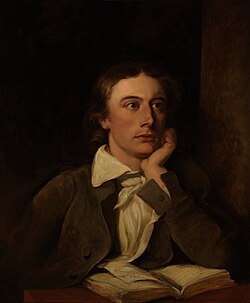John Keats Quote
Thou still unravish’d bride of quietness,Thou foster-child of silence and slow time,Sylvan historian, who canst thus expressA flowery tale more sweetly than our rhyme:What leaf-fring’d legend haunts about thy shapeOf deities or mortals, or of both,In Tempe or the dales of Arcady?What men or gods are these? What maidens loth?What mad pursuit? What struggle to escape?What pipes and timbrels? What wild ecstasy?Heard melodies are sweet, but those unheardAre sweeter; therefore, ye soft pipes, play on;Not to the sensual ear, but, more endear’d,Pipe to the spirit ditties of no tone:Fair youth, beneath the trees, thou canst not leaveThy song, nor ever can those trees be bare;Bold Lover, never, never canst thou kiss,Though winning near the goal yet, do not grieve;She cannot fade, though thou hast not thy bliss,For ever wilt thou love, and she be fair!Ah, happy, happy boughs! that cannot shedYour leaves, nor ever bid the Spring adieu;And, happy melodist, unwearied,For ever piping songs for ever new;More happy love! more happy, happy love!For ever warm and still to be enjoy’d,For ever panting, and for ever young;All breathing human passion far above,That leaves a heart high-sorrowful and cloy’d,A burning forehead, and a parching tongue.Who are these coming to the sacrifice?To what green altar, O mysterious priest,Lead’st thou that heifer lowing at the skies,And all her silken flanks with garlands drest?What little town by river or sea shore,Or mountain-built with peaceful citadel,Is emptied of this folk, this pious morn?And, little town, thy streets for evermoreWill silent be; and not a soul to tellWhy thou art desolate, can e’er return.O Attic shape! Fair attitude! with bredeOf marble men and maidens overwrought,With forest branches and the trodden weed;Thou, silent form, dost tease us out of thoughtAs doth eternity: Cold Pastoral!When old age shall this generation waste,Thou shalt remain, in midst of other woeThan ours, a friend to man, to whom thou say’st,Beauty is truth, truth beauty,—that is allYe know on earth, and all ye need to know.
Thou still unravish’d bride of quietness,Thou foster-child of silence and slow time,Sylvan historian, who canst thus expressA flowery tale more sweetly than our rhyme:What leaf-fring’d legend haunts about thy shapeOf deities or mortals, or of both,In Tempe or the dales of Arcady?What men or gods are these? What maidens loth?What mad pursuit? What struggle to escape?What pipes and timbrels? What wild ecstasy?Heard melodies are sweet, but those unheardAre sweeter; therefore, ye soft pipes, play on;Not to the sensual ear, but, more endear’d,Pipe to the spirit ditties of no tone:Fair youth, beneath the trees, thou canst not leaveThy song, nor ever can those trees be bare;Bold Lover, never, never canst thou kiss,Though winning near the goal yet, do not grieve;She cannot fade, though thou hast not thy bliss,For ever wilt thou love, and she be fair!Ah, happy, happy boughs! that cannot shedYour leaves, nor ever bid the Spring adieu;And, happy melodist, unwearied,For ever piping songs for ever new;More happy love! more happy, happy love!For ever warm and still to be enjoy’d,For ever panting, and for ever young;All breathing human passion far above,That leaves a heart high-sorrowful and cloy’d,A burning forehead, and a parching tongue.Who are these coming to the sacrifice?To what green altar, O mysterious priest,Lead’st thou that heifer lowing at the skies,And all her silken flanks with garlands drest?What little town by river or sea shore,Or mountain-built with peaceful citadel,Is emptied of this folk, this pious morn?And, little town, thy streets for evermoreWill silent be; and not a soul to tellWhy thou art desolate, can e’er return.O Attic shape! Fair attitude! with bredeOf marble men and maidens overwrought,With forest branches and the trodden weed;Thou, silent form, dost tease us out of thoughtAs doth eternity: Cold Pastoral!When old age shall this generation waste,Thou shalt remain, in midst of other woeThan ours, a friend to man, to whom thou say’st,Beauty is truth, truth beauty,—that is allYe know on earth, and all ye need to know.
Related Quotes
Certainly we can say that the pace of modern life, increased and supported by our technology in general and our personal electronics in particular, has resulted in a short attention span and an addict...
About John Keats
Keats had a style "heavily loaded with sensualities", notably in the series of odes. Typically of the Romantics, he accentuated extreme emotion through natural imagery. Today his poems and letters remain among the most popular and analysed in English literature – in particular "Ode to a Nightingale", "Ode on a Grecian Urn", "Sleep and Poetry" and the sonnet "On First Looking into Chapman's Homer". Jorge Luis Borges named his first time reading Keats an experience he felt all his life.
In the later Victorian era, Keats' medievalist poems, such as "La Belle Dame Sans Merci" and "The Eve of St. Agnes", were a major influence on the Pre-Raphaelite movement, inspiring poets such as Algernon Charles Swinburne, Dante Gabriel Rossetti, and William Morris.
